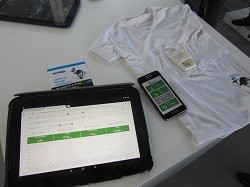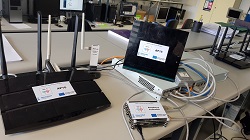A personalised, fully interactive and mobile assistant for independent living
The project has realised a mobile, personalised Butler, created using cutting-edge technologies that will thus ensure that it would be easy-to-use for older people who may not be so technologically confident, and will provide context-sensitive services related to social inclusion, care, physical exercise and cognitive games. Dr Sven Abels, the ALFRED project coordinator, is extremely pleased with the key results and innovations of the project. ‘ALFRED achieved a large amount of key technology results, including excellence in voice interaction (allowing older people to talk directly to the ALFRED Butler), serious games, data storage, and many other domains,’ he commented. Moreover, his team are most proud of the fact that they have managed to find a balance between the technology level and the user level. ‘In many cases, RTD outcomes are dedicated towards technology enthusiasts,’ Dr. Abels explained. ‘In ALFRED, we have integrated users right from the beginning and we are hiding all technology aspects under the hood so that older people can use ALFRED without having to understand the technological details behind our research.’ A project of four pillars The project itself is organised around four key pillars that provide the framework for the ALFRED virtual assistant. The first pillar consists of a User-Driven Interaction Assistant, which aims to empower individuals with age-related dependencies to successfully live independently for longer by delivering a virtual Butler with seamless support for tasks in and outside of the home. ‘This is essentially the core technology when interacting with ALFRED, as people can directly speak to the system – just like people are able to interact with Apple’s Siri, but in a more flexible and extendible way,’ Dr. Abels outlined. Users can ask ALFRED specific questions and issue commands, for example telling it to create a list of forthcoming appointments. ‘This voice-based interaction gives users a means to interact with ALFRED without having to understand the technology,’ continued Dr. Abels. ‘Consequently, it is also well-suited as a result for users who may not have strong eyesight.’ The second pillar is based on voice-based interaction and is focused on actively encouraging social participation by older people by suggesting and managing events and other social activities. This is done through an adaptive user profile that is fully controlled by the user. The third pillar is dedicated towards personalised care processes and does this through direct access to key vital signs for (informal) carers, allowing for the alarm to be raised in the case of a medical emergency. Finally, the fourth pillar concentrates on physical and cognitive impairments prevention. This is achieved through integrating personalised serious games, which aim towards improving the specific physical and cognitive needs of the user. An ALFRED marketplace One of the core components of the ALFRED system is the development of the ALFRED Open Platform that allows third-party developers to produce new functionalities in the form of apps. This approach, which is compatible with the Android Operating System, will hopefully lead to the growth of an Independent Living and Active Ageing sector designed specifically for older people. ‘ALFRED will start with a core set of 25 apps, which have been created by the project team,’ Dr. Abels said. ‘These apps will be rather simple and aim to provide a set for users hand that are already fully usable but also to provide a blueprint for developers to take inspiration when creating new apps.’ To encourage third party developers, the project team offer a flexible runtime environment allowing developers to seamlessly integrate apps to ALFRED – including the crucial voice interaction features. Challenges and next steps Dr. Abels is able to proudly say that the project has been planned and enacted in an manner that has allowed his team to implement all planned features in time and to budget. However, there were some challenges that they had to overcome. ‘We learnt that the user tests took a bit more time than estimated, and we also learnt that the demand for being able to naturally talk to ALFRED was even bigger than expected,’ Dr. Abels explained. He also outlined how they realised that different users will interact with ALFRED in different ways, so they have had to ensure that the system is now flexible enough to handle multiple ways of requesting the same service or piece of information. Moving forward, the team have developed a very comprehensive exploitation plan due to having the opportunity to take part in the EU’s Lean Launchpad Initiative. Many partners will also use single components of the ALFRED system, such as the voice interaction elements or the games developed within the project. ‘We plan to develop ALFRED further and we are currently in active discussions with our partners on how to do this,’ Dr. Abels said.







